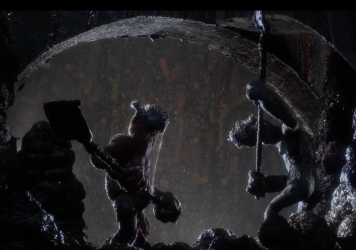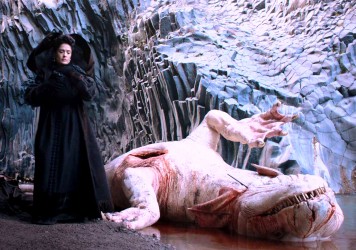Phil Tippett’s long-gestating stop-motion animation epic is a frenzied and frequently deranged Dantean odyssey.
A passion project 30 years in the making – it was started during 1990’s RoboCop 2, shelved, picked up again, and then finally developed with Kickstarter funding – Mad God’s production odyssey feels fully reflected on screen. It’s a film that continually evolves before your eyes, a living, fleshy, horrifying object borne from the mind of Phil Tippett, a stop-motion animator best known for his effects work on Star Wars, RoboCop and Jurassic Park.
With a non-verbal narrative structured according to its creator’s frenzied nightmare logic, the film’s story is always in service of macabre visuals that feel plucked from a William Blake painting and thrown together with whatever was lying around in Tippett’s garage. The director has attributed the project’s prolonged development to him letting different ideas and inspirations percolate over time; the result plays as a hybrid of The Brothers Quay and Tippett’s own past projects.
There’s a griminess to the film’s design that sets it apart from most contemporary stop-motion work. Where something like Coraline was spooky and unsettling, Mad God is intentionally ugly, fusing meat, fluid and rusted metal to nauseating effect. Bodies are crushed by a variety of objects, mulched by giant industrial juicers to feed some monstrous… thing. Creatures with mouths full of what seem to be actual dentures crush whatever is in their path. And that’s just the first 10 minutes.
Through that violence, Mad God feels like it’s exorcising humanity’s sins and self-destructive impulses all at once. Opening with fanfare and what looks like a crude facsimile of the Tower of Babel, the film instantly feels monumental thanks to its incredible sound design (along with some pretty great compositing), despite our acute awareness of its hand-crafted nature and the actual scale of the puppets. The film’s lofty notions extend to an intense atmosphere of religiosity, starting with a passage from Leviticus scrolling down the screen, heeding apocalypse: “Your land shall become a desolation and your cities a ruin.”
Mad God duly descends into that ruin, a world with its own macabre social structure but one which is only explained visually. There’s no dialogue, just floaty prog music accompanying an unnamed masked man – known only as The Assassin – as he descends. Tippett obfuscates his film’s narrative in a way that only adds to its awe-inspiring terror. There’s no discernible plot other than The Assassin trying to take a suitcase full of dynamite… somewhere, sidestepping various horrors on the way.
Tippett reveals the machinations of this sprawling world through various non-sequiturs, such as two ape-like giants having a gladiatorial match, or bug monsters gambling. Some of these digressions don’t entirely work – namely the ones featuring live actors in costume, or when frames are removed from shots to emulate stop-motion. Long sequences featuring a mad, long-nailed scientist feel like a wheel-spinning distraction from The Assassin’s Dantean journey. At least such moments, which are few and far between, serve as a means to reorientate the viewer.
There’s an overwhelming amount of information without explanation here, each grotesque layer the result of a visual artist let loose with time and money as their only constraints. It even reaches a cosmic and theological horror as well as its more earthly horrors of war, desolation and environmental collapse. With its opaque structure and strange manmade monsters, Mad God is a delightfully perverse and mangled story of scripture, like the Watchmaker creation analogy as filtered through the minds of Blake and effects maestro Ray Harryhausen.
Little White Lies is committed to championing great movies and the talented people who make them. But to keep going, and growing, we need your support. Become a member today.
Published 23 Aug 2021
Tippett’s stop-motion work is a major part of some of the biggest science fiction films ever made.
Utterly disgusting. I love it!
A frequently overwhelming sensory experience.

The animator’s long-awaited fusion of handmade sci-fi and horror will premiere at the Locarno Film Festival.

Three decades on from its release, just how accurate was Paul Verhoeven’s classic dystopian sci-fi?

Tale of Tales is a return to a much darker, more traditional form of fantasy storytelling.